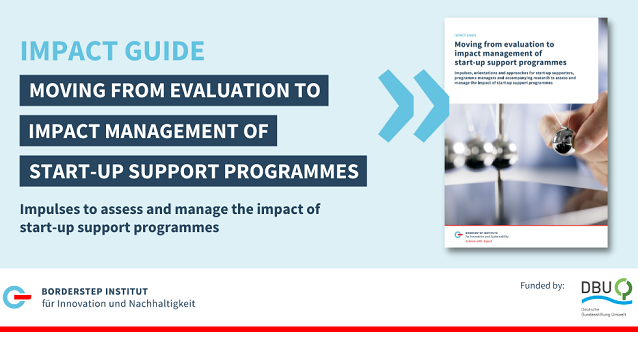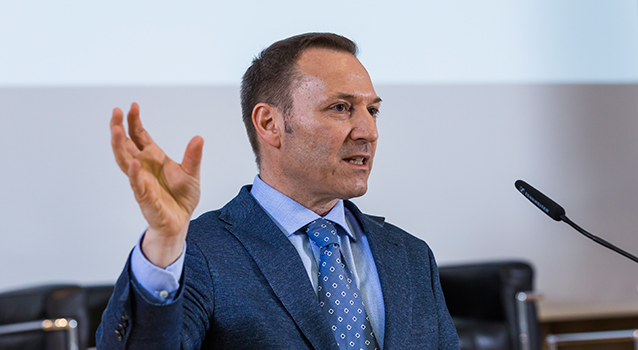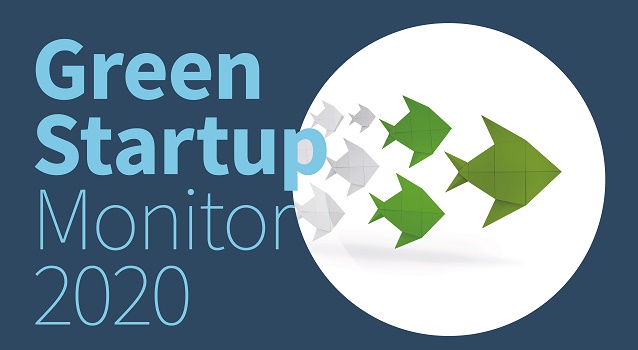ScaleUp4Sustainability: New platform online
New platform launched: As a consortium partner in the EU project ScaleUp4Sustainability, Borderstep is working with a number of universities and companies from Germany, the Netherlands and Sweden to promote the development of innovative, challenge-based teaching and learning programs for sustainable entrepreneurship.
Now, an online platform developed in the project to promote challenge-based collaboration between students and companies has been launched. The Sustainable Venturing Challenges platform aims to facilitate collaboration between companies as challenge providers and students as solution providers.
The platform’s core offering is a growing database that brings together all challenge matchmakers, alliances and initiatives. This is intended to provide a holistic overview of the European landscape of student-business challenges in the field of sustainable entrepreneurship. Challenge profiles, real-life experiences and a series of guides and tools complete the platform offering.
Borderstep further develops the EdiCitNet Marketplace
The EdiCitNet project is entering its next phase: The Edible Cities Network (EdiCitNet) aims to make cities around the world more livable for all by implementing Edible City Solutions (ECS) measures. Since September 2018, the project, which is funded by the European Commission, has been building a global network of cities.
Goal: Establish viable, sustainable business models
Within the network, Borderstep accompanied initiatives, start-ups and people interested in founding companies in the development of viable, sustainable business models. How can knowledge gaps be closed in the effective implementation of Edible City Solutions? What creative revenue models exist? What innovations can be developed along the urban agriculture value chain?
In this context, the Marketplace was launched with the support of Borderstep. The EdiCitNet Marketplace is a digital, collaborative platform for founders and initiatives creating solutions for urban food systems around the world. The goal is to connect Edible City Solutions (ECS), entrepreneurs, institutions, NGOs, and other third parties at local, regional, and global levels to enable global knowledge sharing, scalability, and replicability, and to create complementary collaborations with other companies worldwide.
EdiCitNet marketplace becomes platform for urban food revolution
In the meantime, 50 actors are already represented on the platform. These include pioneers of the Edible City as well as actors who are committed to the urban food revolution at the political and civil society level. The EdiCitNet includes Slow Food Deutschland, Prinzessinnengärten Berlin, degewo, Bundesverband Gebäudegrün, Restlos Glücklich Berlin, Netzwerk Urbane Gärten Berlin, Mundraub, Marktschwärmer, Grüne Liga Berlin and Ernährungsrat Berlin.
What does the Marketplace offer?
- Collaborative networking: round tables, working groups and workshops
- Expertise: support from experts to further develop ECS products/services
- Promotion: a global platform to highlight ECS services and products and find customers and partners
- Free hybrid consulting: a tailored professional consulting service. This is based on the maturity level, position in the value chain, needs, scalability and replicability of the respective company.
Borderstep is part of the EdiCitNet Consulting Team
For the next project phase, the Marketplace will be further developed and integrated into the new “Joint Platform”. The next step will be to further optimize the platform and improve its offerings and functions.
Borderstep will also continue its consulting activities. These include workshops for ECS initiatives as well as one-to-one consulting. As part of the EdiCitNet Consulting Team, the institute successfully participated in a series of events and workshops to advise and support edible city initiatives. Topics were for example sustainable development models or marketing strategies.
Heating and cooling with the help of the sun
Heating and cooling with the sun – how can that work? Borderstep is investigating this in a new project using the example of heat pumps and their technology.
In Germany, 85 percent of heat for heating and hot water is supplied by fossil fuels. To achieve climate neutrality, therefore, the technology must be almost completely converted. Wherever there are or will be no heating networks, the heat pump is the central technology for heating.
The aim of the project is to inform as many people as possible about climate change and to draw their attention to the concrete possibilities of using heat pumps for heating and cooling. In the long term, this should mobilize people to take swift action against climate change. A demonstration system of an air-to-air heat pump with PV system and battery will be used to communicate the function of the heat pump to a broad public.
All information about the project can be found here.
Hydrogen as a panacea?
Is hydrogen really the panacea in the climate crisis? Together with the Institute for Ecological Economy Research (IÖW), Borderstep is analyzing in a new project the areas in which the use of hydrogen appears to make sense for achieving climate goals.
Hydrogen – panacea or hype?
The starting point for the project is the observation that there is currently a massive “overbooking” of green hydrogen by a large number of sectors. This potentially leads to climate targets not being met and there could be negative impacts on alternative transformation pathways.
Providing directional certainty for the climate turnaround
The project builds on insights from interdisciplinary transformation research and the findings of the ITA project Governance of Radical System Innovations (Go) on the importance of directional certainty for the successful transformation of energy, industry and mobility systems.
Borderstep Impact Guide published
Guide for impact management of start-up support programs published
Despite the huge amounts of money invested in start-up support programmes, there is a lack of analysis on the long-term impact of these programmes. Little is known about their economic impacts. Whether the supported start-ups also contribute to climate protection or other societal objectives has not yet been the subject of evaluation of start-up support programmes. With regard to the economic, environmental and societal impact, the principle of hope has prevailed so far. Political actors and programme managers lack reliable evidence.
But how can a support programme be designed for impact orientation? Which methods and concepts are suitable for measuring and evaluating the impact – on the supported start-ups as well as on the economy, society and the environment? To this end, the Borderstep Institute for Innovation and Sustainability developed the IMPACT Guide „Moving from Evaluation to Impact Management of Start-up Support Programmes“.
The IMPACT Guide is a result of the Borderstep project IMPACT of sustainability-oriented start-up support. It was funded and supported by the German Federal Environmental Foundation (DBU Deutsche Bundesstiftung Umwelt). The project developed innovative approaches to analyse and manage the economic, ecological and social impact of start-up support programmes.
The brochure can be downloaded free of charge in English and German.
Background
“What contribution do we want our support programme to make to solving societal challenges?” This question of impact is still asked too little in start-up support. Yet alignment with societal goals offers the opportunity to actively drive sustainable development of business and society. The IMPACT Guide shows how support programmes can develop appropriate impact goals and then monitor their achievement. In this way, the program’s contribution to economic, environmental, and social impact can be understood and maximized.
Impacting society with start-up support
How can the impact that a support programme and its services have on supported start-ups be determined? How can the contribution of a program to positive changes on environment, society and economy be evaluated? And how can the impact be maximized?
These are the questions addressed in the now-published IMPACT Guide, “Moving from Evaluation to Impact Management of Start-up Support Programmes”.
The brochure provides start-up supporters, programme managers and accompanying research with impulses and approaches to assess and manage the impact of start-up support programmes.
The Borderstep Impact Guide can be downloaded free of charge.
ImpactNexus: Sustainability as a success factor
The Borderstep Institute for Innovation and Sustainability celebrates its 15th year of foundation with its first spin-off. Background
How can we leverage technology to assess the sustainability impact potential of new ventures? This is the guiding question that lead to the birth of ImpactNexus.
A spin-off of the Borderstep Institute and the Technische Universität Berlin and officially launched in 2021, ImpactNexus offers scalable SaaS solutions to assess, manage and report the impact & ESG performance of startups and their supporters. This helps startups and portfolio managers like investors, accelerators, incubators and startup support programs to:
☑️ avoid ESG risks,
☑️ maximize positive impacts and
☑️ build impact startups that are good for profits, people and planet.
The team behind ImpactNexus combines many years of academic research, practical industry and startup experience as well as latest tech expertise in software development and AI.
ImpactNexus’ assessment and measurement approaches build on latest academic research and international best practices like the Impact Management Project, @IRIS+ (by The Global Impact Investing Network) or the DIN SPEC 90051-1, a German ISO specification for the sustainability impact assessment of start-ups, co-developed by ImpactNexus.
For more information and contact, visit the ImpactNexus website.
Background
This year, the Borderstep Institute for Innovation and Sustainability turns 15. What are the economic opportunities in climate change? What factors determine the success and failure of sustainable innovations? How does the housing industry benefit from smart technologies? The independent and non-profit research institution seeks answers to questions like these.
Goal-oriented transformation policy
Thinking ahead about the future and providing profound sustainability knowledge for politics, business and society is an integral part of Borderstep’s mission. Thus, even when it was founded, the institute’s practice-oriented research projects focused on topics such as “digitalisation and sustainability”. Something that hardly featured in the public debate 15 years ago. What role do data centres play in energy consumption? How can digitalisation serve to achieve climate goals? What does the sustainable innovation landscape in Germany look like? Borderstep supports a sustainability-oriented transformation policy by continuously collecting data around the topics of energy, ICT, innovation and start-ups. The institute sees itself as a scientific pioneer of change.
Prof. Dr. Klaus Fichter, founder and director of the Borderstep Institute:
“Our focus is on the search for concepts that combine economic success with ecological and social sustainability, for example with climate protection or with the protection of natural resources. Borderstep provides knowledge bases and methods with which, for example, founders and investors can make sustainability an economic success factor.“
Increasing need to understand the sustainability contributions of start-ups
Prof. Dr. Klaus Fichter continues to act as an advisor to the EXIST-funded spin-off, which is currently going through the incubation process at the Centre for Entrepreneurship at the TU Berlin. Klaus Fichter notes an increasing need to reliably measure and assess the sustainability contributions of start-ups, the so-called “impacts”. However, assessing the sustainability contribution of start-ups is a challenging task, due to their limited historical track record, volatile business models and limited resources. The Borderstep spin-off addresses these challenges with digital solutions, in line with the institute’s long-standing focus on digitalisation and sustainability.
Digital solutions for assessing start-ups
Dr. Jannic Horne, Research Fellow of the Borderstep Institute, heads the start-up as CEO and brings his research expertise in impact measurement for start-ups to the company. The former management consultant sees many advantages in the close integration of ImpactNexus with the world of science.
Dr. Jannic Horne, CEO ImpactNexus:
“Science provides us with numerous insights into the social and ecological opportunities and risks of economic activity. Unfortunately, it is often not possible to make these findings usable for companies. Digital solutions offer a unique opportunity to make these insights more accessible to start-ups, investors and their partners.”
ImpactNexus offers scalable solutions for assessing, managing and reporting the social and environmental potential and risks of start-ups. This helps start-ups, investors, accelerators, incubators and funding programmes to avoid sustainability risks and maximise positive impacts for people and the environment.
The assessment and measurement approaches are based on the latest academic research and international best practices such as the Impact Management Project, IRIS+ or DIN SPEC 90051-1, a German ISO specification co-developed by Borderstep and the ImpactNexus team.
Customised support increases sustainability impact of start-ups
How can technologies be used to assess the sustainability potential of new companies? This shared interest brought the founding team together. Under the umbrella of the Borderstep Institute, the working group laid the bases for ImpactNexus. With an intensive customer discovery phase, the development of the first digital prototypes and the acquisition of funding.
By being accepted into the EXIST funding programme of the Federal Ministry for Economic Affairs and Energy (BMWi), ImpactNexus was able to launch as an independent company at the beginning of 2021. In constant exchange with customers, a first applicable product, a Minimal Viable Product, was created for the evaluation and assessment of the impact of start-ups. In the meantime, the product range has been expanded.
ImpactNexus also develops solutions to support investors in complying with the EU Sustainable Finance Disclosure Regulation. This has resulted in a process for assessing the ESG (Environmental, Social & Governance) performance of start-ups.
In addition, the team is working on AI-supported processes to make the topic of sustainability even more accessible in the future. For example, a knowledge database on the social and ecological impact of companies is currently being set up, from which benchmarks on CO2, supply chain risks and similar topics can be read out automatically.
Borderstep strengthens ImpactNexus team
To ensure that the spin-off’s growing staffing needs can be met soon, Borderstep is also supporting ImpactNexus in terms of personnel. Constanze Trautwein, a researcher at the Borderstep Institute until August 2021, now heads product development at ImpactNexus. In addition to her industry and start-up experience, she led the development of Europe’s first DIN SPEC for sustainability assessment of young companies.
Alexander Schabel, Senior Project Manager at Borderstep, will also join ImpactNexus operationally at the end of the year. He will take care of sales and marketing. The founder of his own start-up also has years of expertise in the start-up ecosystem (including the StartGreen platform and the organisation of the StartGreen Award of the Borderstep Institute) as well as practical experience as a start-up evaluator.
NGIN: Borderstep on grand challenges
In their newest web series, the international network NGIN is putting their members into the spotlight!
This video is looking at The Borderstep Institute of Innovation and Sustainability (Borderstep) with co-founder and CEO Dr. Severin Beucker. He explains how Borderstep is working to transform an entire region into a sustainable, climate-neutral data hub.
ISPIM 2021: Borderstep Impact Forum
The Borderstep Impact Forum 2021 is dedicated to the topic of sustainability assessment and impact measurement of start-ups.
The Borderstep Impact Forum 2021 will take place on June 21 & 22, 2021, as part of the annual conference of the International Society for Professional Innovation Management (ISPIM) in Berlin. It is dedicated to the topic of sustainability assessment and impact measurement of start-ups.
More information you will find at our event website.
Green Startup Monitor 2020
The Green Startup Monitor 2020 celebrated its premiere on 29 April. The key findings of our Green Startup Monitor 2020 are now available in English!
The Green Startup Monitor analyses the importance of those start-ups that contribute with their products and services to the ecological goals of a green economy. The representative study is based on data collected through an online questionnaire from 1,620 innovative and growth-oriented companies that are less than 10 years old and have their headquarters in Germany.
Green startups are more confident about their future and want returns for all, people and planet! Green startups have a key function as an engine for structural change. Which hurdles do they struggle with? How can they best be supported?
The global economy is vulnerable. The current crisis shows that. The resilience of the economy must therefore be the focus of economic reconstruction. But how can we succeed in building a sustainable economy?
What are the biggest challenges for green start-ups?
Green start-ups can play a model role in this context. They have become an important part of the German start-up ecosystem. One in five German start-ups classifies itself in the green economy. What is the situation for these start-ups in Germany? What are the biggest challenges? And how are they mastering the crisis?
The Green Startup Monitor was published by the Borderstep Institute for Innovation and Sustainability in cooperation with the German Startup Association and was supported both technically and financially by the German Federal Environmental Foundation.
You can download the Green Startup Monitor 2020 free of charge here.
StartGreen@School invited to Helsinki
The Borderstep project StartGreen@School was selected by a jury of the Federal Ministry for Economic Affairs and Energy as the German finalist of the European Business Promotion Award. The winners of the German preliminary decision have been invited to Helsinki for the European award ceremony: “The two selected projects are involved in important socio-political areas. They recognise the current challenges and promote sustainable and responsible entrepreneurship. I wish them every success for the award ceremony in Helsinki in November,” said the Federal Government Commissioner for SMEs, Christian Hirte.S
StartGreen@School promotes sustainable start-up culture in schools. “With the selection of StartGreen@School, the Federal Ministry for Economic Affairs and Energy shows that the promotion of sustainable management is becoming increasingly important. We are very pleased to be able to present the project at European level,” emphasizes Dr. Katharina Reuter, head of the StartGreen@School project.
Since 2006, the European Commission has been awarding the European Business Promotion Award to public authorities, business and educational institutions as well as public-private partnerships that have rendered outstanding services to promoting entrepreneurial spirit and entrepreneurship. The prize is awarded in the 28 member states of the EU as well as in Iceland, Norway, Serbia and Turkey.
StartGreen@School promotes a sustainable start-up culture in schools. The project partners include Borderstep, UnternehmensGrün e.V., the Futur Institute of the FU Berlin and BildungsCent e.V.
StartGreen@School is funded by the Federal Ministry for the Environment, Nature Conservation and Nuclear Safety as part of the National Climate Initiative (NKI).




